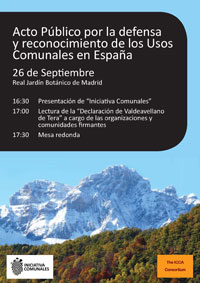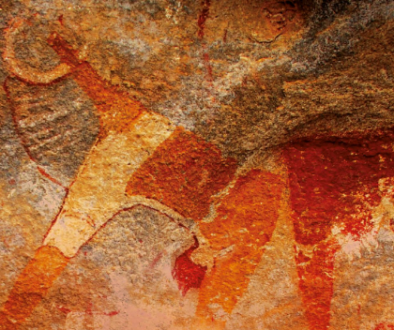Presentation of the Iniciativa Comunales and the Declaration of Valdeavellano de Tera
Madrid, Spain26 September 2014
On Friday September 26, 2014, there will be the presentation of the working group Iniciativa Comunales and its core document, the Declaration of Valdeavellano de Tera, for the defense and recognition of communal uses in Spain. The event, held at the Royal Botanic Garden of Madrid, Spain, at 4:30pm, will include a presentation of the Initiative and the Declaration. Next, the ten points of the statement will be read by representatives of the various signatory communities. After the briefing, a roundtable will take place, to discuss the comments and questions of the press and other attendees. Finally, new initiatives and future plans of the working group will be presented.
Iniciativa Comunales is a working group formed by representatives of communities that are managing a variety of communal uses in Spain (shellfish and fisherman’s guilds; traditional forestry and hunting associations; grazing, shepherds and ranchers councils, etc.), as well as NGOs working in defense of these uses and nature conservancy, and research groups who study and preserve the economic, environmental and social heritage held in communal uses. The common philosophy of all these organizations is the defense and recognition of Indigenous & Community Conserved Areas.
ICCAs are based on three pillars: Community, where a defined group of people are attached to a territory or local system resources; Governance, when these local communities collectively held major management decisions, standards development and compliance; and the Conservation of Nature, when the management and governance of these communities contributes to the conservation of these areas or its environment recovery. When an area meets these three requirements it can be considered an ICCA.
The Declaration of Valdeavellano de Tera, for the defense and recognition of community uses and ICCA in Spain, is a collective document whereby Iniciativa Comunales wants to establish basic principles to foster the political recognition of this huge but little known economic, social and environmental heritage in Spain. On the other hand, this Declaration aims to open a social debate and to contribute to the recognition of the values of these uses and their related heritage by society at large. Finally, it pretends to rediscover the potential of these forms of governance on natural areas for the future. The Silene Association has supported the Declaration.





